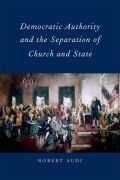
This book clarifies the relation between religion and ethics, articulates principles governing religion in politics, and outlines a theory of civic virtue. It frames institutional principles to guide governmental policies toward religion and counterpart standards to guide individual citizens; and it defends an account of toleration that leavens the ethical framework both in individual nations and internationally. Democratic states must protect the liberty of citizens and must accommodate both religious liberty and cultural diversity. This democratic imperative is one reason for the increasing secularity of most modern democracies. Religious citizens, however, commonly see a secular state as unfriendly toward religion. This book articulates principles that enable secular governments to protect liberty in a way that judiciously separates churchand state and fully respects religious citizens. After presenting a brief account of the relation between religion and ethics, the book shows how ethics can be independent of religion-evidentially autonomous in a way that makes moral knowledge possible for secular citizens-withoutdenying religious sources a moral authority of their own. With this account in view, it portrays a church-state separation that requires governments not only to avoid religious establishment but also to maintain religious neutrality. The book shows how religiousneutrality is related to such issues as teaching evolutionary biology in public schools, the legitimacy of vouchers to fund private schooling, and governmental support of <"faith-based initiatives.>" The final chapter shows howthe proposed theory of religion and politics incorporates toleration andforgiveness as elements in flourishing democracies. Tolerance and forgiveness are described; their role in democratic citizenship is clarified; and in this light a conception of civic virtue is proposed.Overall, the book advances the theory of liberal democracy, clarifies the relation between religion and ethics, provides distinctive principles governing religion in politics, and provides a theory of toleration for pluralistic societies. It frames institutional principles to guide governmental policy toward religion; it articulates citizenship standards for political conduct by individuals; it examines the case for affirming these two kinds of standards on the basis of what, historically, hasbeen called natural reason; and it defends an account of toleration that enhances the practical application of the ethical framework both in individual nations and in the international realm. INDICE: Contents Preface and Acknowledgments Introduction Chapter 1 The Autonomy of Ethics and the Moral Authority of Religion The Autonomy of Ethics Moral Knowledge: General and Particular Religion, Theology, and Ethics Theoethical Equilibrium: The Integration of Religion and Ethics Divine Command Ethics and Secular Morality Chapter 2 The Liberty of Citizens and the Responsibilities of Government The Separation of Church and State and the Limits of Democratic Authority The Liberty Principle and the Scope of Religious Freedom The Equality Principle and the Case Against Establishment The Neutrality Principle: Accommodationist Secularity Religious Neutrality, Valuational Neutrality, and Public Policy Chapter 3 The Secular State and the Religious Citizen Freedom of Expression in the Advocacy of Laws and Public Policies Major Principles Governing the Advocacy of Laws and Public Policies The Charge of Exclusivism Toward Religious Reasons Natural Reason, Secularity, and Religious Convictions Religious Reasons, Political Decision, and Toleration Privatization Versus Activism: The Place of Religious Considerations in Public Political Discourse Chapter 4 Democratic Tolerance and Religious Obligation in a Globalized World The Natureof Tolerance Is Tolerance a Virtue? Toleration and Forgiveness The Normative Standards for Democratic Toleration Religion in the Workplace as a Test Case for a Theory of Toleration Cosmopolitanism as a Framework for Tolerance Civic Virtue and Democratic Participation International Implications of the FrameworkConclusion Endnotes Index
- ISBN: 978-0-19-979608-3
- Editorial: Oxford University
- Encuadernacion: Cartoné
- Páginas: 200
- Fecha Publicación: 29/09/2011
- Nº Volúmenes: 1
- Idioma: Inglés
